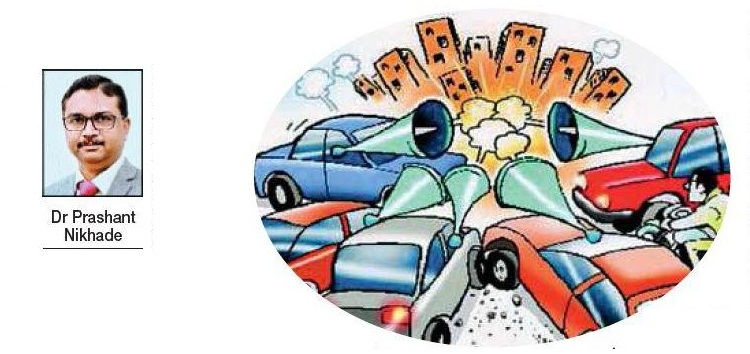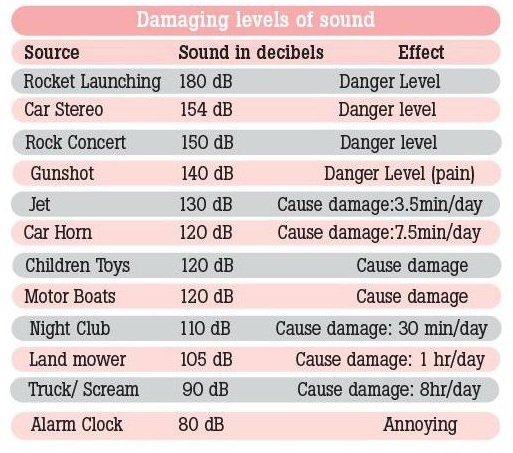Beware! Hearing car horn for 7 minutes can do major damage to ears
01 May 2020 09:47:54

Principal Correspondent :
IT MAY be shocking for everyone, but if we hear car horn for even seven minutes per day, it can do major damage to ear. Though in the days of lockdown, one may get to see less number of vehicles the habit of honking is on. Dr Prashant Nikhade, Vice Chairman of National Initiative for Safe Sound (NISS), a unit of Indian Medical Association said, “The Center for Hearing and Communication (CHC) founded the yearly event in 1996 to encourage people to do something about bothersome noise.” S o u n d that is unwanted or disrupts one's quality of life is called as Noise. Sound becomes undesirable when it disturbs the normal activities such as working, sleeping, conversations. W h e n there is lot of noise in the environment, it is termed as Noise pollution.

Main source of noise pollution is increasing population and urbanization. Transportation, construction of buildings, highways, industrial noise, loud speakers etc are some sources causing noise pollution. Dr Nikhade pointed out, “Constant exposure to loud noise (more than 85 dB) is common and can lead to higher frequency Sensorineural Hearing Loss. Zero decibel is the quietest sound and each 10 dB increment will double the sound intensity. The higher the decibels, the shorter is the amount of time one can be exposed to the sound before hearing loss occurs (8 hours for 85 dB a day, 4 hours for 88 dB, 2 hours for 91 dB or just 15 minutes at 100 dB).”
A whisper is 30 dB, conversational speech is 60 dB and shout from an arm's length is 85 dB. Exposure to noise greater than 120-125 dB can cause hearing loss or pain in the ears. The permissible work limit for noise is 8 hours for 90 dB, 4 hours for 95 dB and 2 hours for 100 dB, explained Dr Nikhade, President of Association of otolaryngologists, Vidarbha chapter. “75 dB in daytime and 70 dB in night time in industrial area; 65 db in daytime and 55 db in night time in commercial area; 55 dB in daytime and 45 dB in night time in residential area and 50 dB in daytime and 40 dB in night time in silence zones are permissible. Silence zones are areas up to 100 meters around hospitals, educational institutions, courts. Head phones which do not screen out background noise encourage users to increase the volume up to the levels that may cause long term hearing damage,” Dr Nikhade elaborated. “There is a direct link between noise and health. Noise pollution can damage physiological and psychological health. High Blood Pressure, Ischemic heart disease, Stress related illnesses, Sleep Disturbance, Hearing Loss and Productivity loss are some problems related to Noise.
It can also cause memory loss, severe depression, panic attacks. Adverse effects on wild life, marine life are also very common,” said Dr Nikhade Dr Nikhade comes up with solution for the prevention of noise pollution. “Download sound volume measuring app on mobile phone. Planting bushes and trees in and around sound generating sources, regular servicing and tuning of automobiles, use of suitable noise absorbing material for the walls, windows, ceilings in construction of buildings can help in reducing noise pollution.Workers should use ear protection equipment such as ear plugs, ear muffs for hearing protection. Don't stand close to loud speakers with sound output over 80 dB.
Regulations should be imposed to restrict the usage of playing loud speakers in crowded Areas and public places. Avoid honking on Roads. Social Awareness programs to educate the Public about the causes and ill effects of noise pollution. IMA HQ is already spearheading this movement of public awareness nationwide through its NISS wing by observing this day by organising No Horn (Honking ) Day.” “Vidarbha AOI appeals everybody to take up this issue seriously and play their part in noise pollution awareness individually,” urged Dr Nikhade.